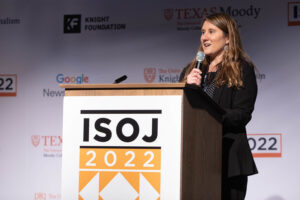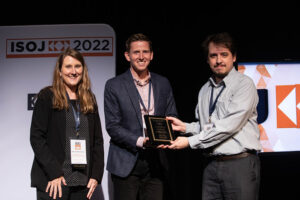April 2, 2022 | Artificial Intelligence, ISOJ2022, Research
Researchers reflect on how artificial intelligence influences the generation and distribution of news and its ethical implications

Returning to in-person after two years exclusively online, the official research journal of the International Online Journalism Symposium (ISOJ) presented in a panel the peer-reviewed official research publications for the 2022 issue of #ISOJ Journal. The papers focus on implications associated with artificial intelligence (AI) and its growing interconnection with news and journalism.
AI, also known as machine or artificial intelligence, is a branch of computer science that focuses on building and managing technology that can learn to autonomously make decisions and carry out actions on behalf of a human being, explains the IT education website Techopedia.
Before each researcher presented their papers, Amy Schmitz Weiss, ISOJ Research Chair, opened the panel by giving the #ISOJ 2022 top research paper award to Daniel Trielli and Nicholas Diakopoulos (Northwestern University) for Algorithmic Agenda Setting: The Shape of Search Media During the 2020 US Election.
The following is a summary of each work presented in the panel.
Lindsay Grace, Knight Chair of Interactive Media and an associate professor at the University of Miami School of Communication, was the first researcher to take the mic to present Exploring Reporter-Desired Features for an AI-Generated Legislative News Tip Sheet.
Grace, based on the premise that scientists and journalists should work together, was part of a team from the California Polytechnic State University and the University of Miami to implement and evaluate a prototype tool for journalists: an AI-produced tip sheet system called AI4Reporters.
The idea of the project is to provide a tool for journalists to summarize potentially newsworthy developments happening in legislatures. The AI system automatically generates stories and manages electronic “tip sheets” based on recent legislative events and data.
“This basically scraped public data from state legislative proceedings and then lifted within minutes that content into a basic sifting system observing anomalies and newsworthy events for us. We discover news events, we put them in the reporting archive and then create tip sheets,” said Grace.
Grace also presented conclusions of the focus group they made to explore journalists’ perceptions of the role of such tools in their work. Some of them were concerned about how the algorithm actually works and its version of transparency.

Trielli began his presentation by reflecting on how the media influence public discussion and opinion. And how search engines, as an extension of the media, should also be evaluated in the same way.
The study answers two questions: to what extent do the topics selected by search media replicate the agenda of the news media? And to what extent does searcher input alter these topics?
“We compared news coverage about political candidates during the 2020 elections in the United States and the search results about that. We contrasted the topics that were extracted by those news media reports and those searches about a candidate. And we compared those topics to see if there was a correlation between the votes,” said Trielli. “And for the second question about the power of the user, we basically searched for the candidate again. We took the search results and we did kind of an adversarial exercise with the search engine in which we searched for a candidate plus an interesting topic,” the researcher added.
The conclusion reached by the researchers after data extraction and analysis is that neither the news media nor the user alone have the power to shape the salience of topics in search results or search media. On the other hand, the search media can drive, shape, or even counteract choices that are made by journalists and readers.
The last paper presented at the panel is entitled The Missing Piece: Ethics and the Ontological Boundaries of Automated Journalism. Colin Porlezza and Giulia Ferri, from the Institute of Media and Journalism at the University Della Svizzera Italiana in Switzerland, were virtually present to talk about their work.
Their study aimed to evaluate the relevance of ethical and democratic principles in the ontological construction of automated journalism. “As artificial intelligence becomes pervasive in newsrooms, ethical principles — such as accountability, transparency, reliability, and others — need us to carefully evaluate the ontology of these augmented tools,” Porlezza said.
The study sought to answer three questions: What kind of opportunities and challenges does automation pose for the democratic role of news media? To what extent are ethical issues mentioned by experts? And what kind of ontological issues arise in relation to the implementation of automation?
Ferri explained that the data for the analysis was obtained through semi-structured interviews with 20 experts in five countries (Austria, Germany, Spain, Switzerland, and the United Kingdom). The experts, which included journalists, editors, journalism scholars and media managers, were asked about the most relevant journalistic innovations in the last decade.
When it comes to findings, Porlezza explained that the use of AI in newsrooms usually has an economic drive, meanwhile ethical issues are not a primary concern. “In spite of economic logics that are currently dominating the discussion around news automation in news organizations, we think that ethical issues should actually become a primary concern in news industry debates,” Porlezza said.

The panel ended with final thoughts about the future of AI in journalism and its ethical implications.
“These papers bring up really interesting questions about how AI has and will continue to influence the way that news is discovered, where it’s distributed, and the kinds of ways that it interfaces with democratic implications,” concluded Dr. Seth Lewis, professor and guest editor for this journal issue.
All the research from the panel can be read in volume 12, number 1 issue of the #ISOJ Journal available on the symposium website.

